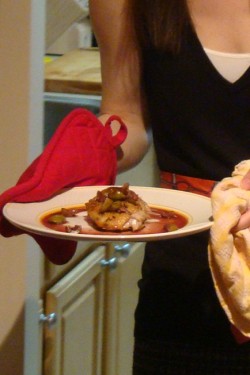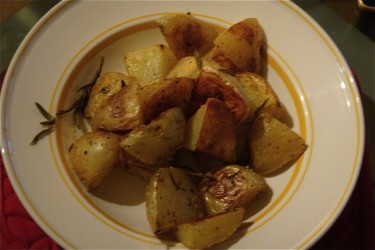 When in doubt, a wise man once said to me, add more duck fat. I don’t think he knows how to boil water, but he does know this. I hadn’t considered it before, but now, I can’t say I disagree. To be sure, you wouldn’t like duck fat in your chocolate cake (I think), but you can use it in a pie crust, and probably want it on most other things. If you’d rather not think about it, that’s fine. Go to a nice restaurant and order the rillettes, confit duck leg, or mashed potatoes. There will be lots of duck fat in all of those. At least there should be.
When in doubt, a wise man once said to me, add more duck fat. I don’t think he knows how to boil water, but he does know this. I hadn’t considered it before, but now, I can’t say I disagree. To be sure, you wouldn’t like duck fat in your chocolate cake (I think), but you can use it in a pie crust, and probably want it on most other things. If you’d rather not think about it, that’s fine. Go to a nice restaurant and order the rillettes, confit duck leg, or mashed potatoes. There will be lots of duck fat in all of those. At least there should be.
You either are the kind of person who keeps duck fat at home or you aren’t. If you fall into the former category, you don’t need me to sing the praises of potatoes roasted in duck fat. They’re completely perfect. So I’ll move along. If you are not the kind of person who has a tub of duck fat in the freezer, reading this post might not convince that you need it. But if you’re on the fence about it, which is what I was, you should really try it! If there is any concern about the nutritional consequences, consider that these potatoes—or whatever else you cook in the stuff—will be so perfect you will only need one or two small ones to be completely thrilled with your dinner. And, at least one purveyor has argued that from a health perspective, duck fat is more like olive oil than butter. (Admittedly, I find this hard to believe.)
A by-product of last winter’s DIY duck confit was about a half cup of you-know-what which had been sitting comfortably in my freezer, waiting patiently for the perfect moment to come along and prove this wise man right. Which it did. Spring is usually the time when all things green and frilly appeal to me again, but the other day it was cool and rainy and far too humid to make a woman’s hair anything other than a fuzzy mess and the rest of her anything other than completely grouchy. Virtuous salad was not in order. But neither was going shopping. It was not the kind of rain that makes you want to sing or dance, just hurry home and avoid wool at all costs. Yuck.
I wanted something meaty. And easy. Enter potatoes roasted with rosemary and duck fat. I can’t really give you a recipe for this because it’s too easy. Roast them until they’re perfect. But I can tell you what I served with them.
 Yet another by-product of the winter’s duck confit was a couple of duck breasts, also sitting in my freezer. I like duck with orange. Cherries are another natural pairing, but I hate pitting cherries, and didn’t have either of these things at home anyway. Serving duck with nothing at all was not entirely appealing. But then the proverbial light bulb moment. Olives would balance the richness of the duck just as well as any sweet fruit could, and fennel seemed to go well enough with that. There wasn’t much logic in it, but it was pretty good, and I was very smug. Perhaps I wasn’t right to be proud. I might have overcooked the duck a smidge. But still. There were those potatoes. The wise man was right. Not a bad way to end a grouchy day.
Yet another by-product of the winter’s duck confit was a couple of duck breasts, also sitting in my freezer. I like duck with orange. Cherries are another natural pairing, but I hate pitting cherries, and didn’t have either of these things at home anyway. Serving duck with nothing at all was not entirely appealing. But then the proverbial light bulb moment. Olives would balance the richness of the duck just as well as any sweet fruit could, and fennel seemed to go well enough with that. There wasn’t much logic in it, but it was pretty good, and I was very smug. Perhaps I wasn’t right to be proud. I might have overcooked the duck a smidge. But still. There were those potatoes. The wise man was right. Not a bad way to end a grouchy day.
Seared duck breast with fennel + green olives
You will want a splatter screen for this. If you don’t have one, I hope you still read the recipe, but you might not want to make it, unless you like scrubbing your stove. I hear that some people find this cathartic. I am not one of them.
1 duck breast, weighing about 7oz/200g | big pinch fennel seeds | pinch thyme leaves | pinch dried chiles | salt and pepper | 4 or 5 green olives, pitted and chopped | red wine
Score the duck skin: Run your knife along the skin to make 3 or 4 parallel incisions through the fat, without cutting into the meat. Repeat at a 90 angle to create a cross-hatch pattern. Rub duck with fennel, thyme, chiles, salt, and pepper. Marinate for 24 hours if possible, but don’t worry if it’s not. Bring to room temperature before cooking.
Heat a small frying pan over medium-low for a couple minutes. Add duck to the dry pan, skin side down, and don’t move it. If it doesn’t sizzle, that’s okay. The idea is to melt off some of the fat before searing it. After a good bit of the fat has rendered—for my skinny duck breast this was about 3 minutes—turn the heat to medium-high. After an additional 4 minutes, see if you can turn the duck. If it seems stuck, let it alone. It will unstick when it is ready to be turned. Cook on the meaty side for 3 more minutes. Then turn again and cook on the first side for 2 more minutes. Depending on its size, you want the duck to spend about 12-15 minutes in the pan for medium or medium-rare.
Remove duck to a plate, skin side up. Discard the grease in the pan. Off heat, add a couple glugs of red wine. Over low heat, scrape up the sticky bits in the bottom of the pan. Add the olives. Let simmer for a couple of minutes. Taste and season. After the duck has rested 5 or 10 minutes, slice on a diagonal, fanning the pieces out on a plate. Spoon over some of the olive red wine jus, and pass the rest at the table.
Serves 2
{ 2 comments… read them below or add one }
I love the use of the left over duck. It is nice you can plan a couple of meals from one shopping trip. Plus it sounds great. About the potatoes they sound great. I layer one layer of white or yukon golds with a layer of sweet potatoes mixed with a little olive oil, rosemary,or whatever herbs you have love the blog
Ooh. Love the idea of mixing up the two potatoes!